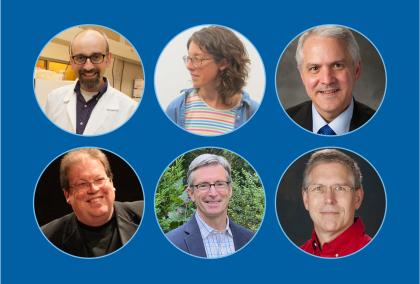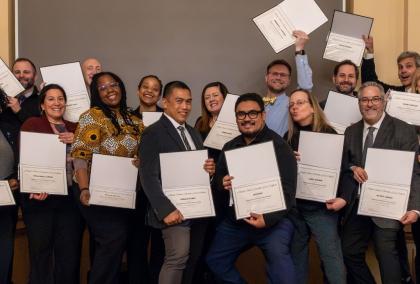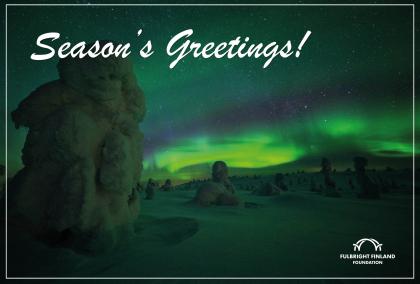Visiting student researcher status
Read more about the visiting student researcher's (VSR) status on a U.S. university campus on our student categories webpage.
Starting Point
Choosing a suitable university is influenced by factors such as the motive for going to the U.S. for a research visit; for some grantees, it is important to have access to specific materials, archives, or equipment, while many grantees seek to study under the guidance of an expert in their field.
The "Fit": Academic and Financial
You need to find a university that fits both your
- academic plans and your future goals as well as
- your financial situation
Academic Fit
When considering the university's academic fit for you, take these questions into account:
- Do your research interests and focus match the potential department and host?
- Who do you want to work with in the U.S. (i.e., your research adviser/host)?
- What scientific questions in your field are you trying to answer, and who can help you with that?
- Where can you learn something new?
- What do you need from your host/research adviser in the U.S. (e.g. how much engagement, mentoring)?. It is important to talk about these questions in advance when choosing your host to make sure you have realistic expectations with the host you end up selecting.
- What can the host institution offer you as a visiting student researcher?
- Do they have the important research facilities you need?
- How about office space, lab access, library access, and housing, for instance?
- How well could you integrate into the host department and research team within your area of interest? How well could you network and make connections there? Would your potential colleagues typically work on campus, or do they primarily work remotely?
Expand your horizons!
The U.S. offers a vast array of exceptional universities. Focus on finding the one that aligns best with your specific research interests.
Financial Fit
It is important to think realistically about how you will cover all your expenses while in the U.S. When evaluating whether a university is a financial fit for you, it's important to consider the full scope of expenses, including:
- Possible university fees for visiting student researchers
- Health insurance
- Travel costs
- Personal expenses
- Living expenses (e.g. housing, food) in the specific city or area where the university/research institution is located
University expenses
- University costs and fees vary by university. Find out from the university what fees and costs might apply to you as a visiting student researcher. Don't assume anything. Even though VSR's are typically not charged tuition fees, they might be charged with other fees up to a total of USD 20 000 for a 9-month stay.
- Universities do not typically provide funding for those not completing a degree at the institution.
Living expenses
Find out what the cost of living is in the area and consider if you can afford to live there. The cost of living in the U.S. has increased significantly in recent years and varies depending on the area. The most expensive areas to live in are, for example, New York City, Boston, and California, and the more affordable areas are, for example, Indiana, Ohio, and Wisconsin.
- The monthly maintenance rate (MMR), which refers to the estimated monthly cost of living in a specific U.S. city or region, is USD 2 800-USD 4 300 per month (including housing, food, transportation, incidental expenses, books, and supplies), depending on the area. This rate is used to determine how much funding a student needs to qualify for a visa and to cover living expenses during their studies.
- MMR in Los Angeles, California is USD 4 300/month and in Milwaukee, Wisconsin USD 2 830/month
- In addition, if you have a spouse and/or children joining you in the U.S., you will need to take into account USD 660-USD 1 330/month for your spouse and USD 330-USD 665/month for each child.
- In the visa application phase, you will need to prove you have enough funds to cover
- possible fees and the other costs listed above, and
- your living expenses (and the living expenses of possible family members) for the duration of your research visit (i.e. MMR x 9-12 months).
- You can seek extra funding, as long as Fulbright Finland remains your primary affiliation. Check our list of additional funding for other possible grants and scholarships to apply for.
Finding a suitable host
- Grantees often identify leading researchers and potential advisers by reading current articles, papers, and journals in their field. By noting where these authors studied and where they currently teach, you can find strong host universities or institutions that match your research focus and connect with scholars whose work aligns with your interests.
- Ask people in your networks for field-specific tips on suitable universities or institutions to visit with your research focus:
- Who are the faculty members your professors are connected with in the U.S.?
- How about the networks of your mentors, colleagues, and advisers in your field - put their international networks to use!
- Use the Fulbright Finland Foundation's network of alumni, professors, and researchers - check out the Outreach Ambassadors, for example.
- Ask current doctoral students and alumni for their experiences and learn what it's like to work with this particular host, department, or university. Ask those who have worked with the adviser/host for their tips and experiences. You might find information on suitable alumni on the university's or program's home pages. You can also ask for possible alumni information from the Foundation.
"Huomasin kuitenkin jo alkuvaiheessa, että hostiini oli vaikea saada yhteyttä ja hän teki oharit myös käytännön asioiden hoitamiseen liittyvän Zoom-tapaamisemme suhteen ennen lähtöäni Yhdysvaltoihin. Yliopistolle päästyäni minulle selvisi, että vaikka kyseistä professoria pidettiin hyvänä ohjaajana, hänellä oli myös maine siitä, ettei hän pitäytynyt aikatauluissa ja sovituissa tapaamisissa." -Finnish Graduate Student
- There have been several cases in the past where Fulbright VSR grantees met with their research advisers only once or twice during the entire academic year. Others were disappointed that their advisers lacked time to review the grantee's research questions or plan in depth. That’s why it’s crucial to discuss the host’s availability and expectations in advance.
- Have more than one potential adviser: It’s smart to choose a university where there are other researchers you could work with if your main adviser becomes unavailable. Try to connect with another professor at the same university so you have more than one contact. Sometimes advisers get new job offers or start new projects and may leave before or during your visit. Having a backup contact helps keep your plans on track.
- Find out what practices the host university has regarding visiting student researchers. What services are provided to visiting scholars or researchers (VSRs)? For example, can you audit courses or attend lectures? Are you allowed to participate in orientation events? What kind of campus access will you have?
Who is the Chair of the department?
The Chair often sets the department’s research priorities and strategic focus. If their work aligns with yours, it’s a good sign the department supports your field.
Ranking lists
If you wish to look into ranking lists, it's often more useful to focus on field-specific university rankings than general rankings. Always check the methods and evaluation criteria used to compile each list. Ranking lists should never be your only source of information when selecting universities.
Approaching a potential host
When searching for a host who would match your own goals and needs, reach out to potential hosts to confirm the research match and to understand their expectations and supervision style.
- If you have a mutual contact, ask them to introduce you to the potential host.
- Talk to potential hosts at your field-specific workshops, seminars, and conferences.
- Send a cold email
- If you don’t have a pre-existing relationship with the person, send a short message by very briefly describing your research interest and how it relates to the professor’s work.
- Personalize your e-mail for the specific person and department.
- If the conversation progresses, propose a virtual meeting to discuss collaboration in more detail.
- To understand how much mentoring a professor might be able to offer during your visit, you could ask whether they are already supervising several doctoral students.
- Make sure the professor will work at the university when you arrive (not on a sabbatical, then, for instance)
- After agreeing on the visit, ask what the formal procedure is for receiving visitor status at the institution. Are there any deadlines to consider or paperwork to file? What does the visitor status entail concretely?
- Request an invitation letter (instructions below) and ask the host to fill in the Direct Affiliation Form needed from hosts welcoming a visiting student researcher through the Fulbright Program.
Letter of Invitation
The letter of invitation (LOI) highlights the most important information about the research affiliation. The letter needs to be ready along with the other documents needed for your visa application (usually by April).
The letter must include the following:
- Your grantee status at the host university: visiting scholar or visiting student researcher?
- Exact start and end dates of the affiliation (e.g. August 15, 2026 to June 14, 2027, or for a 9-month period commencing August 15, 2026)
- Name and title of the research adviser who will work directly with you (the grantee)
- Fees that the host institution will collect for this affiliation
- What are you provided? Office space, telecommunication connections, library access, housing, access to lab, etc.?
- The letter should be signed by an official university officer (for example, the Dean or research adviser).
- The letter should be on the U.S. institution’s official letterhead.
Use this checklist to secure your U.S. research visit as a Fulbright VSR.
Alumni comments on the importance of background research
Universities have very different policies, for example, the University of Houston would have given me a much better status as a student, but in Austin, I was neither a student nor staff and the people working in the general administration didn’t even know what a visiting researcher is.
Olisin saanut saman tason opetusta muualtakin -suomalainen maisteriopiskelija Harvardissa
Suosittelen kyllä lämpimästi tuleville Fulbrightereille sitä, että on hostin etsimisen suhteen luova alan ja tutkimusaiheiden suhteen ja että miettii yliopistovalintaa tehdessään myös sitä, millaisessa paikassa haluaa elää ja tehdä tutkimusta. Tärkeää olisi löytää ennen kaikkea sellainen host, joka vaikuttaa olevan innoissaan tehtävästä, jonka tutkimuksesta itse innostuu ja jonka kanssa kommunikointi sujuu alusta asti hyvin. Jälkikäteen toivoisin, että olisin huomannut aiemmin sen, ettei homma toimi ja yrittänyt vaihtaa hostia tai yliopistoa.
Kun tulevat Fulbrighterit ottavat yhteyttä potentiaalisiin hosteihin, kannattaa jo alkuvaiheessa kysyä, millaisia käytäntöjä hostaamisen suhteen yliopistossa on ja onko esimerkiksi kyseisellä laitoksella vuosittain paljon vierailijoita.
Jos lähtee vierailevaksi tutkijaksi (visiting student researcher/visiting scholar), kannattaa selvittää yksityiskohtaisesti mitä yliopisto tarjoaa ja mitä ei. Mitään ei kannata olettaa.
Summa summarum voisin todeta, että mitä enemmän voi selvittää tietoa eri yliopisto- ja host-vaihtoehdoista sen parempi, mutta sattumalla on tietenkin aina oma roolinsa.


